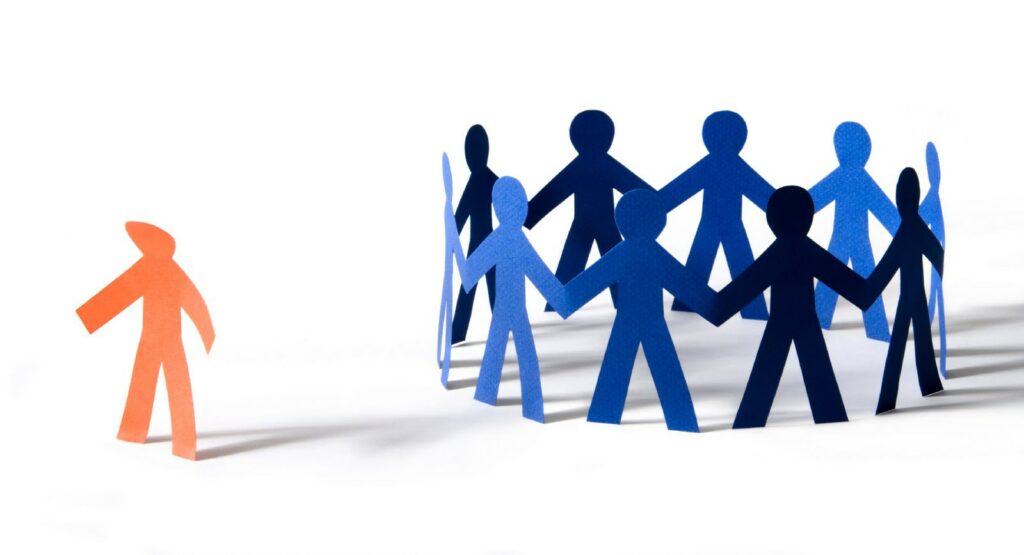Stigma and discrimination can be harmful to people with mental illnesses, workplaces, and households. Learn more about the definition of stigma and how it’s related to prejudice and discrimination in this blog post!
Contents
What Are Stigma and Discrimination?
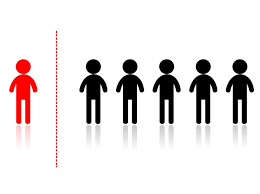
The terms stigma, prejudice, and discrimination are often used interchangeably. They all refer to negative attitudes and actions towards people who are different from the mainstream.
“Stigma refers to the characteristics by which a group is judged negatively; it includes both stereotypes (exaggerated beliefs) and prejudices (preconceived negative attitudes).”
“Prejudice is an unjustified attitude that leads to discrimination. Discrimination happens when people act on their prejudices, excluding or mistreating others because of their group membership.”
So, mental illness stigma has three main components: fear, ignorance, and contempt. Here, stigma is reinforced by the way we talk about mental illness. Negative attitudes about mental illness are often built around the words we use, and language can perpetuate stigma. Further, prejudice and discrimination can lead to unfair treatment in employment, housing, education, legal systems, relationships with family and friends, and in many other aspects of daily life. For instance, people with mental illnesses are often seen as dangerous or incompetent.
Types Of Stigma
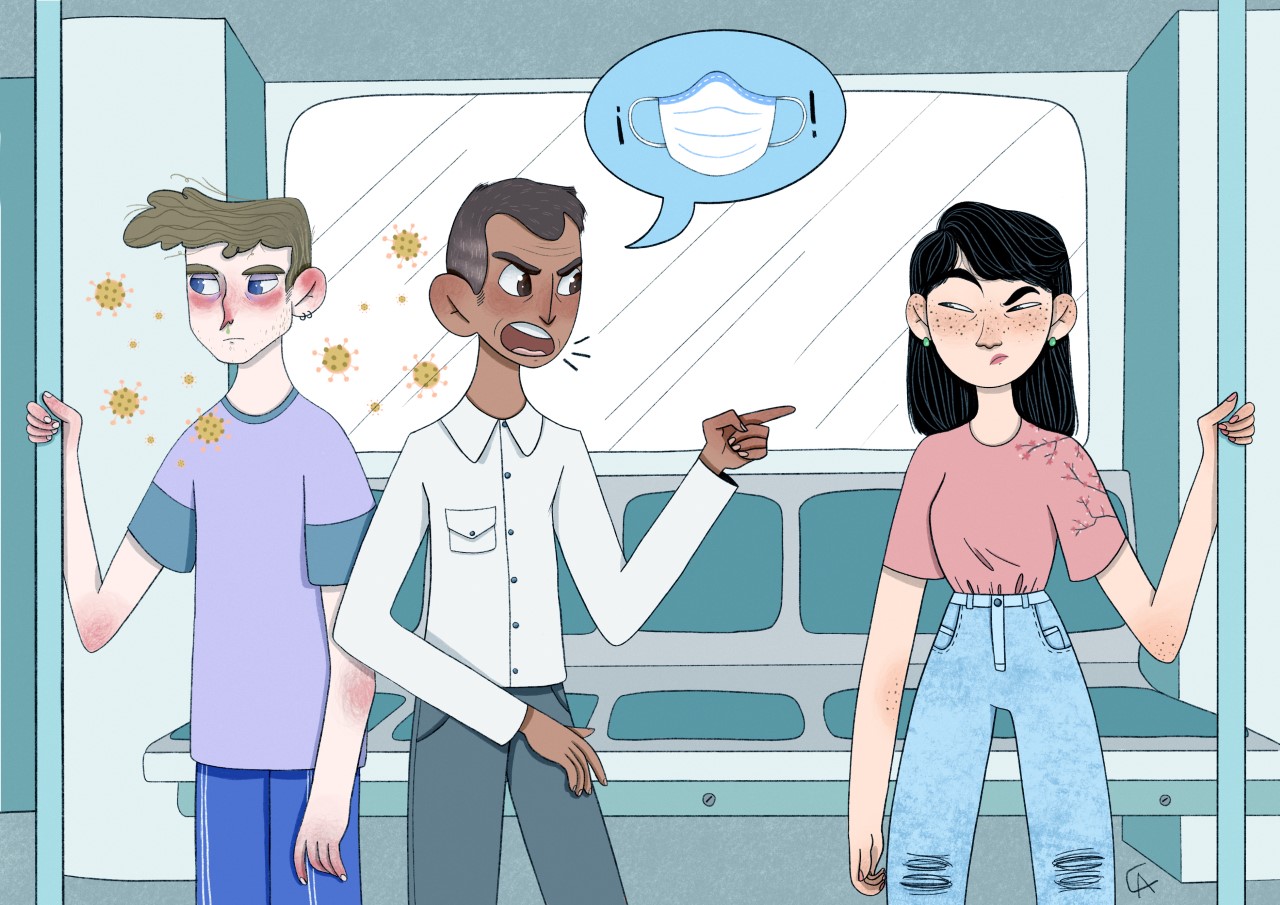
There are several types of stigma:
Public Stigma
Public (or societal) stigma is the discrimination that occurs when people with mental illnesses encounter negative attitudes from society at large. For example, media reports about violence or mass shooters often focus on the mental health of the shooter, despite a lack of evidence that people with mental illnesses are more likely to be violent.
Stereotype Stigma
Stereotype or label stigma is the use of negative labels to describe people who have a mental illness. For example, referring to someone as a “crazy person” or an “insane asylum patient.”
Symbolic Stigma
Symbolic stigma is when people with mental illnesses are seen as less valuable or virtuous than other members of society. This might manifest itself in discrimination against people with mental illnesses when it comes to things like medical care, housing, or employment.
Structural Stigma
Structural stigma is the discrimination that people with mental illnesses experience in the systems and institutions of society such as schools, hospitals, workplaces, etc.
Self Stigma
Self (or internal) stigma is when individuals begin feeling negative about themselves because they have or once had a certain condition such as schizophrenia, depression, substance abuse problems, and so forth.
Stigma in the Workplace
There is a lot of stigma and discrimination in the workplace against people with mental illnesses. Many employers hold inaccurate stereotypes about people who have a psychiatric disability that cause them to discriminate unfairly against these individuals when it comes to hiring, promotions, or other aspects of employment.
Stereotypes held by managers can include:
- People with mental illness are dangerous; no one wants to be around them.
- People with mental illness are unreliable; they won’t show up for work on time or they will take too much sick leave or vacation time.
- They aren’t smart enough to do the job well and tend to make poor decisions (for example, forgetting their keys).
- There is a lack of understanding about mental illness and its effects on people’s performance at work.
Employers may not want to hire someone with a psychiatric disability out of fear that co-workers will make fun of or stigmatize them, be afraid of their condition, etc. They also worry about the economic cost associated with hiring someone in this population who might have more absences or need more time to complete tasks.
Stigma In The Household
There is also a lot of stigma and discrimination against people with mental illnesses in the household. For instance:
- This often takes the form of family members not wanting to talk about mental illness or pretending it doesn’t exist.
- There can be a lot of shame and guilt associated with having a mental illness, which can lead to secrecy and isolation.
- Family members may feel guilty or responsible for their loved one’s condition, and end up blaming themselves.
- Someone with a mental illness in the family might not be able to do certain things that other members of the household can; this can lead to resentment.
People who have a mental illness often face discrimination from others in society (see above section) and family members may begin to feel as if they are being treated the same way.
NOTE: Prejudice, discrimination, and labeling can often exclude a person socially from family, friends, or the community at large. In turn, this may limit work opportunities which result in economic exclusion. When people with mental health problems do experience prejudice or discrimination, it is usually because they have been labeled in some way. Labels act like stereotypes when applied to an individual. Once you label someone as ‘schizophrenic’ (for example) you might start to think of them as ‘crazy’ and treat their behavior accordingly.
Harmful Effects of Stigma and Discrimination
Stigma and discrimination can have several harmful effects on people with mental illnesses.
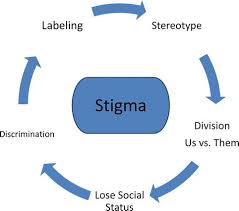
- They can lead to a decrease in self-esteem and feelings of worthlessness.
- People may be less likely to seek help for their mental illness when they experience symptoms, out of fear of judgment and mockery.
- Stigma and discrimination can also keep people from finding and keeping jobs, or from obtaining housing or other essential services.
- People with mental illnesses may feel isolated and alone, which can lead to depression and anxiety.
- In some cases, stigma and discrimination can even result in violence or abuse against people with mental illnesses.
Beating Down Stigma And Discrimination

How To Deal With Stigma And Discrimination?
There are a few things that people can do if they experience or witness stigma and discrimination against someone with a mental illness:
Educate yourself about mental illness
This includes learning the facts about these conditions, what they entail and how they impact people’s lives.
Speak out against discrimination when you see it happening
If you see someone being treated poorly because of their mental illness, say something.
There is power in numbers and by standing up against discrimination, we can help to stop it from happening.
Show your support for people with mental illnesses
When you see or hear someone making fun of or discriminating against someone with a mental illness, stand up and say something. You don’t have to get into a big fight with someone. Just calmly let them know that these kinds of comments aren’t okay in your book.
Remember: The best way to deal with stigma is through education, awareness, and conversation!
What Do People Need To Know?
People need to have open conversations about mental illness with their family members, friends, and acquaintances. So that they can start dispelling myths, stereotypes, and stigmas associated with these conditions. To begin with:
- People who have mental illnesses are just like everyone else.
- We should treat them with respect, dignity, and fairness in all walks of life, including education, employment, and housing opportunities.
- People with a psychiatric disability can often lead full, productive lives if they have good access to treatment for their condition(s).
- We must not judge a person’s behavior on the basis of diagnosis alone; it is important to understand that symptoms can vary widely from one individual to the next and that symptoms of mental illness may vary from day to day or hour by hour.
How To Have Open Conversations About Stigma And Discrimination?
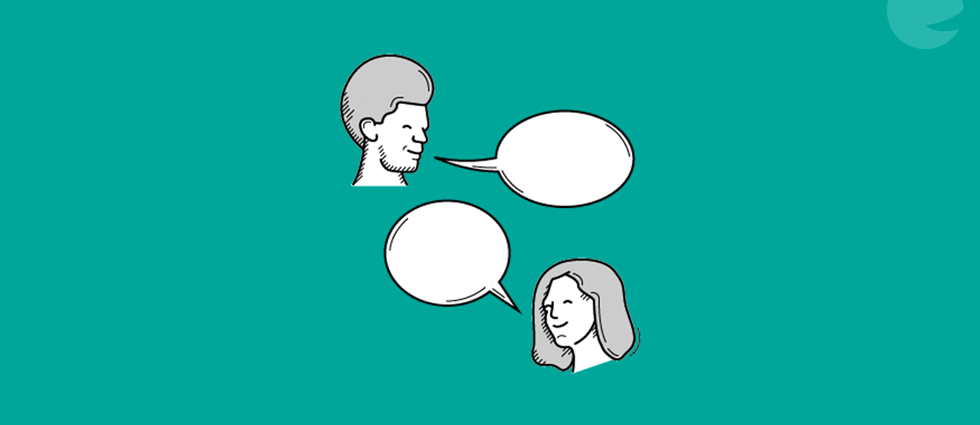
Some tips for having open conversations about stigma and discrimination. Try these simple tips for talking about mental illness with your friends, family, and acquaintances:
- Start by asking people if they have any experience with mental illness – either their own or someone else’s.
- Don’t be afraid to ask questions; chances are, others will have the same questions.
- Remember that symptoms can vary widely from one individual to the next.
- Be respectful of other people’s opinions, even if you don’t agree with them.
- Be open to learning something new about mental illness and the people affected by it.
- Help dispel common myths, stereotypes, and stigmas about these conditions – many of which are simply not true at all!
- Be an advocate for people with mental illnesses and speak out against discrimination when you see it happening.
NOTE: If you’ve had a bad experience because someone close to you has a psychiatric disability, positively share your story. This can help to show that there are people with mental illnesses who lead full, productive lives and contribute positively to society in many ways!
Professionals’ View On Stigma, Prejudice, And Discrimination

There is a lot of discussion about stigma and discrimination, from people who have a mental illness, their family members, or friends. But what do professionals think of these issues? Mental health nurses believe that there are three important aspects to this: awareness, acceptance, and openness.
- Awareness means understanding the facts about mental illnesses; not just believing in myths you hear about them.
- Acceptance means accepting people with a mental illness as they are; recognizing that their condition does not define them and it’s okay to talk about your differences.
- And finally, openness is important for working together in order to provide the best care possible to everyone involved.
Stigma and discrimination have been around forever and it doesn’t look like it will be going away any time soon. However, by being aware of these issues and working together, we can make a difference in the lives of people who have a mental illness.
“Stigma, prejudice, and discrimination are barriers to recovery. They create negative attitudes in society that prevent people who have experienced mental illness from living full lives free of shame or guilt about their condition.”
Talking To A Professional
If you are experiencing stigma or discrimination because of your mental illness, talking to a professional can be really helpful. Professionals who work in the field of mental health have heard it all before and they will be able to help you deal with these issues in a healthy way. They may also be able to provide you with resources and support networks that will help you feel better.
Conclusion
Stigma and discrimination can have a devastating impact on those affected, preventing them from accessing the help that they need. It is important to address these issues as soon as possible to improve conditions for all people suffering from mental health issues. There are many ways we can take action against stigma and discrimination. Such as talking about our experiences openly, educating others, and supporting those who are facing stigma and discrimination. With enough commitment and effort, we can create a society where everyone is treated with respect and dignity, regardless of their mental health status.
If you are looking for affordable Online Counseling MantraCare can help: Book a trial therapy session
